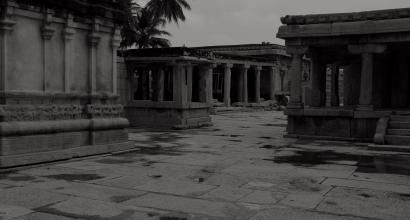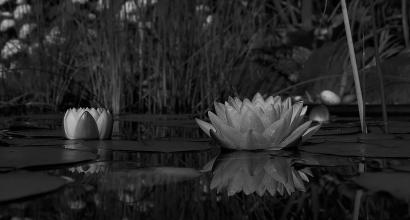Culinary skills
Venkatanaranappa was our chief by default in all our endeavours. He led our tours and cooked our meals. In those days, several places lacked electric supply. Everywhere we went, Venkatanaranappa cooked for us, and when he did so in places which were not electrified, Venkannayya was to hold a candle to aid his cooking. When I tried to extend my helping hand, he would snap – “Don’t come here! Amidst your chatter and laughter, the candle will melt down and the wax will fall over the vessels”.
This is what happened in Hampi. We reached there around six in the evening. The place was infested with deadly scorpions. A month before we went there, there was a huge local festival and the manṭapa was full of garbage. Venkatanaranappa said – “You may start visiting the sites now. Go around and come back a bit later”.
When we returned back after visiting some sites of interest, we were surprised to find one of the manṭapas entirely cleaned of the ash and traces of food residues. The portion of the manṭapa which was to be used for cooking had been made tidy and the stove was cleaned too. Delicious food, cooked with the help of the candle held by Venkannayya, was waiting for us to consume. After our dinner, we slept in the Navaraṅga inside the temple, scared of scorpions lurking around the place. We were tried and had a tasty meal – we forgot ourselves and slipped into deep sleep quickly.
Compassion
The next morning, Venkatanaranappa came to us and said “Did you sleep well? Coffee is ready. Would you like to drink it after brushing and freshening up or do you want to have bed-coffee?” Ironically, Venkatanaranappa never drank coffee!
How can someone not remember such a person? How can we refrain from lauding his nature?
We had planned to pay a visit to different sites in Hampi that afternoon. We got ready after having our lunch. Venkatanaranappa brought four jugs full of coffee, tightly closed the lid and wrapped each of the jugs with a cloth. He said –“You three carry these. I will bring one with me”. He had wrapped the cloth to protect heat from escaping. He knew that the rest of us loved coffee and had taken effort to prepare it for us!
Once, on my way back from one of the (Kannada) Sāhitya-sammeḻanas, I happened to break my trip at Gadag. That night, I was fortunate to eat the food prepared by Venkatanaranappa. The next morning was similar too. We were to catch a train at about nine-thirty in the morning. As we were in a hurry to reach the railway station, we were unable to have our breakfast in peace. There was delicious food left over. Venkannayya and I came up with a plan – when Venkatanaranappa had stepped out to fetch water from a well, we mixed rice with the huḻi (a dish from Karnataka, typically eaten with rice) he had prepared, added ghee and filled it in a large container. We similarly packed curd rice in another container. We closed the mouths of the two containers with cloths and put them on to the train with the rest of the luggage. We seated ourselves in the Second Class and placed the food containers next to us. I was eager to finish eating and gestured so to Venkannayya. He looked at Venkatanarappa. We realized that there were two Muslim men who shared the coach with us.
Venkatanaranappa said – “What is this? You think you can’t wash until they leave?” We controlled our laughter. The Muslims got off at the next station. Venkatanaranappa asked – “What is this, don’t you follow any maḍi-mailige?”
We forgot about the embarrassment we had caused and feasted on the packed food.
Venkatanarappa knew by heart the plants and herbs that the inhabitants of villages and forests regularly used. Once, when the Kannada Sahitya Parishat was compiling Someśvara-śatakam, a mention of the tree ‘Kañcavāla’ (ಕಂಚವಾಲ) was found. I had never heard of such a tree. Venkatanaranappa knew about the tree and also told us where the tree could be found in Bangalore. It was supposedly located towards the East of the Shankaramata in Shankarapuram, where a Kalyāṇa-maṇṭapa (wedding hall) now stands. Apparently, somebody in the past had committed suicide by hanging themselves from the tree. He not only narrated the incident to us, but also brought the leaves, flowers and fruits of Kañcavāla’ tree and showed them to me.
There was yet another plant I got introduced to, through him. It was called ‘Laṅjamuṇḍa-kūra’(లంజముండ-కూర) in Telugu. This, apparently could be used to prepare huḻi (ಹುಳಿ), huḻitovve (ಹುಳಿತೊವ್ವೆ) and other dishes.
Egg plant (brinjal) was Venkatanaranappa’s favourite vegetable. He used the following verse from Sumati- śatakam to support his stance always.
(Sumati- śatakam was composed in the thirteen Century during the reign of the Kākatīya queen Rudramadevī
ವಂಕಾಯಿವಂಟಿ ಕೂರಯು
ಪಂಕಜಮುಖಿ ಸೀತವಂಟ ಸಾಧ್ವೀಮಣಿಯನ್ ।
ಶಂಕರುಣಿವಂಟಿ ದೈವಮು
ನಿಂಕೆಚ್ಚಟನಿಟ್ಟ ಭಾಗ್ಯ ಮುಂಡುನು ಸುಮತೀ।।
("Where else can you find a vegetable like Brinjal, a devout wife like the louts-faced Sītā and a deity like Śaṅkara. All this is possible only because of good fortune!")
Coffee Plant
Venkatanaranappa had grown just one coffee plant in his house. It had grown well and he was always thrilled to find flowers in the plant. He happily showed the flowers to everyone.
I asked him “You don’t drink coffee, right?”
His answer – “What if I don’t drink? There are others who drink! Friends and relatives visit me often. Many of them, of course, drink coffee!”
Hospitality
Venkatanaranappa invited people he respected to his house. He served them a lavish meal. One of the distinguished guests who had the privilege of visiting his house was a scholar from Dharwad by name Mahadevashastri Prabhakarashastri Pujar. Just as he was respected for his scholarship, he was held in high regard for his noble qualities too. He was a humble person and had authored several works. It was only natural for Venkatanaranappa to have immense respect for him. Brahmashri Togere Nanjunda Shastri and Nanjunda Shastri of Kadaba were also a part of the feast Venkatanaranappa had arranged. I was there on the occasion too. Lunch was served on a nice plantain leaf. The food was mouth slurping! We had our meal at leisure relishing every bite. Everything was perfect – the following words of the Veda came to my mind immediately “śucī rocata āhutaḥ”
Mahadevashastri Prabhakarashastri Pujar
M.P. Pujar was a great scholar of Sanskrit and Kannada. He worked as a lecturer in a Training College in Dharward for several years. His mastery over Kannada literature and grammar was unmatched. The ṭīkā (commentary) written by Kuṇḍalagiri-ācārya on the fourth adhyāya of Śabdānuśāsanam is lost and on the request of the Vidyavardhaka Sangha, Pujar composed the commentary and hence brought a completion to the work. This helps us get a feel of the kind of scholarship he possessed. The lectures delivered by Pujar in 1952 in the Kannada-śodhana-saṃsthā on the topic ‘Kannada- vyākaraṇa’ are fondly recollected by people even today. The study of the alphabet, proposal for a book on Kannada phonetics (Śikṣā-grantha), discussions on sandhis that sound jarring, the missing of conjugational suffixes (vibhkati-lopa-vicāra), gamakasamāsa, a few non authentic constructions of hosagannaḍa – these were the topics he talked about in the lectures. His insightful analysis of the subjects is something which every student of linguistics will benefit from. En güncel ve yüksek deneme bonusu veren siteler 2023 listesi üzerinden deneme bonusunuzu alın. Bonus veren bahis siteleri için lapalmroyalbeachhotel.com adresimizi ziyaret edin.
Innocence (of Bellave Venkatanaranappa)
Venkatanarappa was not well exposed to worldly matters. He found it difficult to understand the nature of certain people. Once, one of his friends was admitted to the Victoria hospital due to some ailment. Venkatanaranappa visited him every evening to enquire about his wellbeing and to provide as much assistance as he could. Whenever he went, he saw a woman sitting by the patient’s side, weeping constantly. She, however, was decked in brand new saree, expensive jewellery and fresh flowers in her hair.
One evening, when Venkatanaranappa visited the friend as usual, there was another friend of his who had come to visit the patient. Venkatanaranappa asked him
V: “Why does she do this? She comes here and cries every day! What will happen to her? Won’t this emotionally weaken the patient too?”
Friend: (Remained silent for a while. Once they were outside the hospital…) “Don’t you know? She is his wife!”
V: “That’s right! Why does she have to cry every day?”
Friend: “She wants to unnerve her husband looking at her state – she wants to prove to him how much his wife cares for him. Will he not think – “Ah! My wife is such a pativratā!”
V: “If so, why should she come so heavily decked up?”
Friend: “So that her husband feels happy. It might enthuse him to live longer.”
V: “What is this? Weeping and instilling hope – both are to take place simultaneously?”
Friend: “You won’t understand this. Her sorrow is for her husband to see, her beauty is for the people on streets to relish.”
V: “Let her get lost! I only wish this isn’t an added worry for the patient.”
After a few days, the patient apparently left the world.
This is the seventeeth essay in D V Gundappa’s magnum-opus Jnapakachitrashaale (Volume 3) – Sahityopasakaru. Thanks to Hari Ravikumar for his thorough review











































